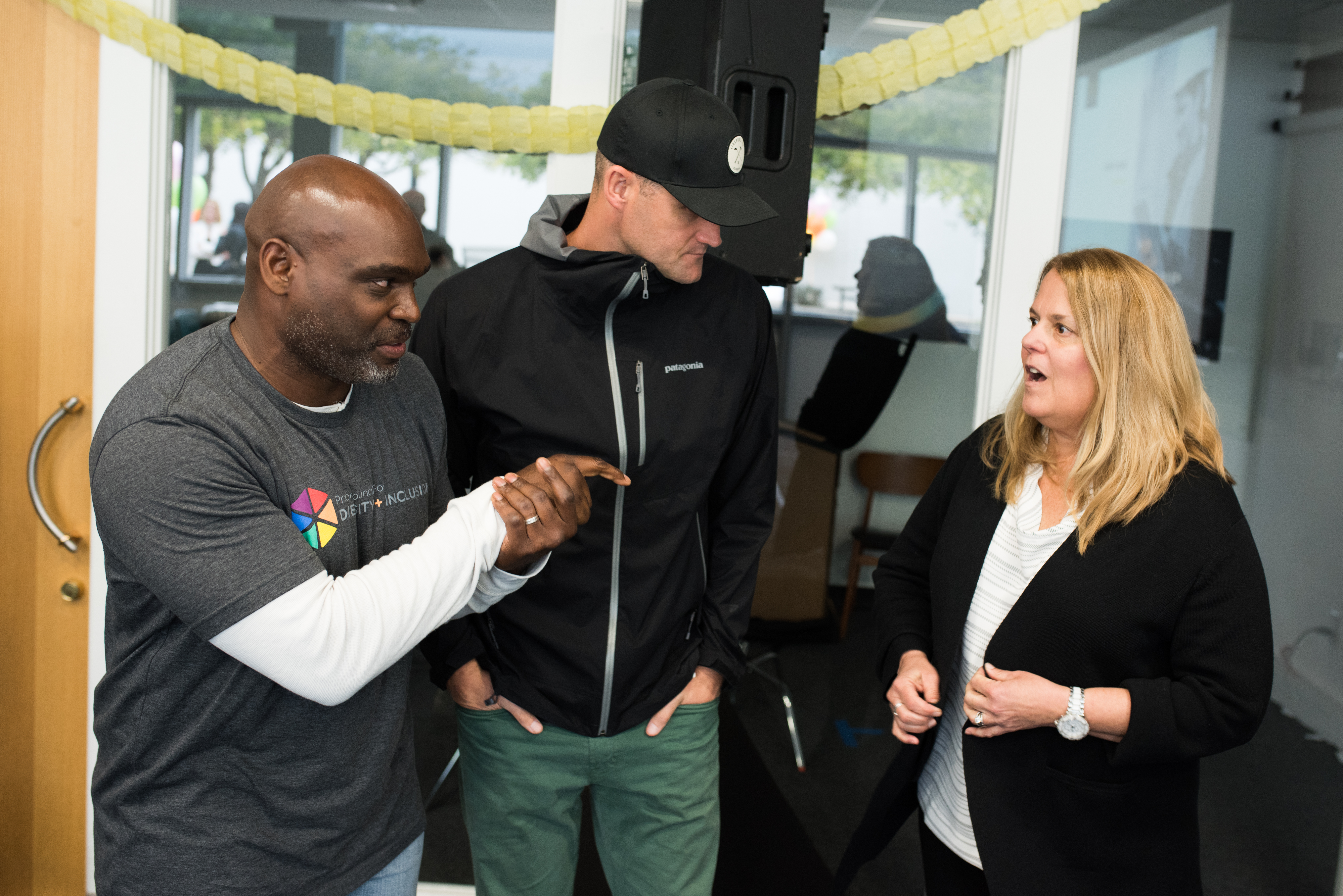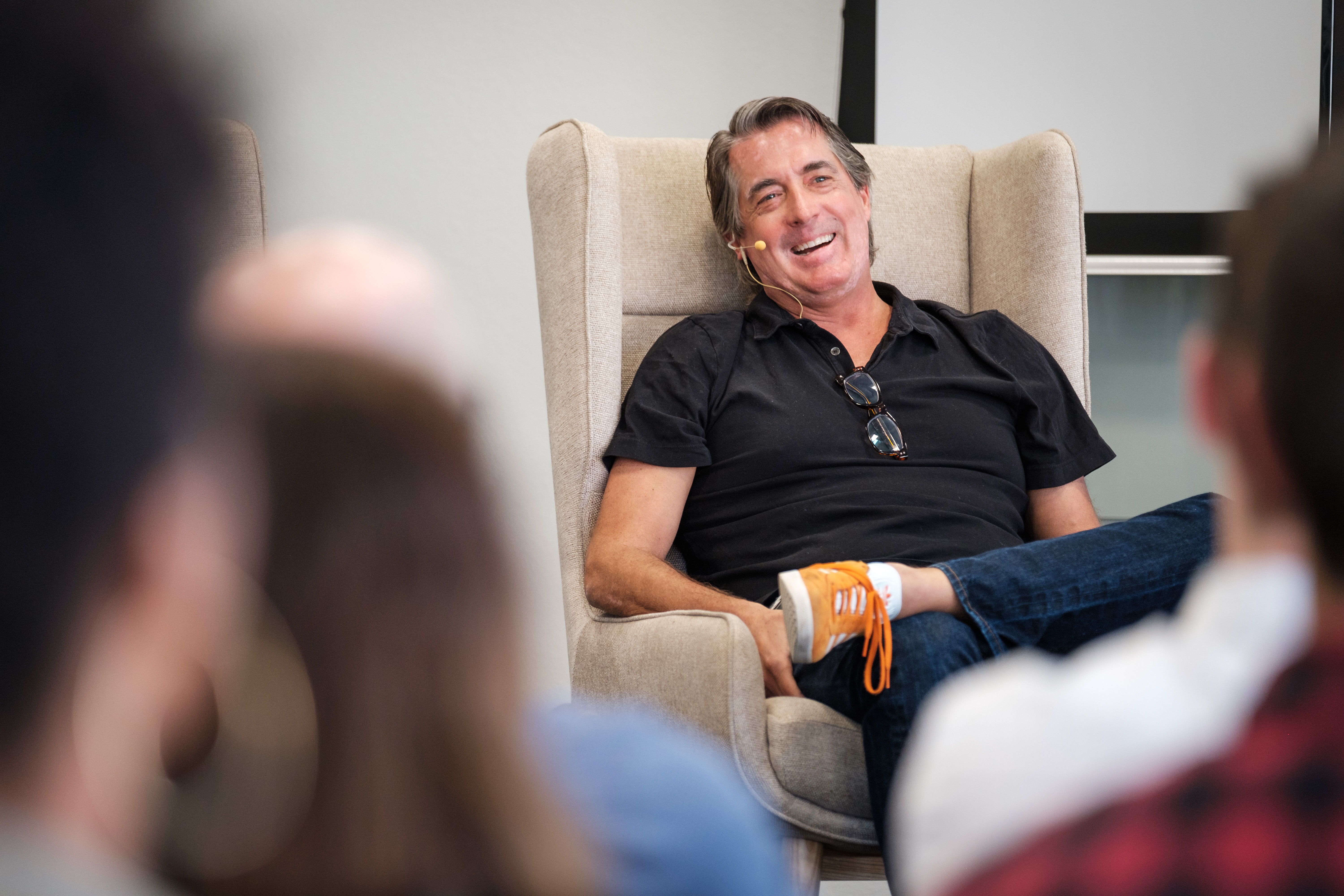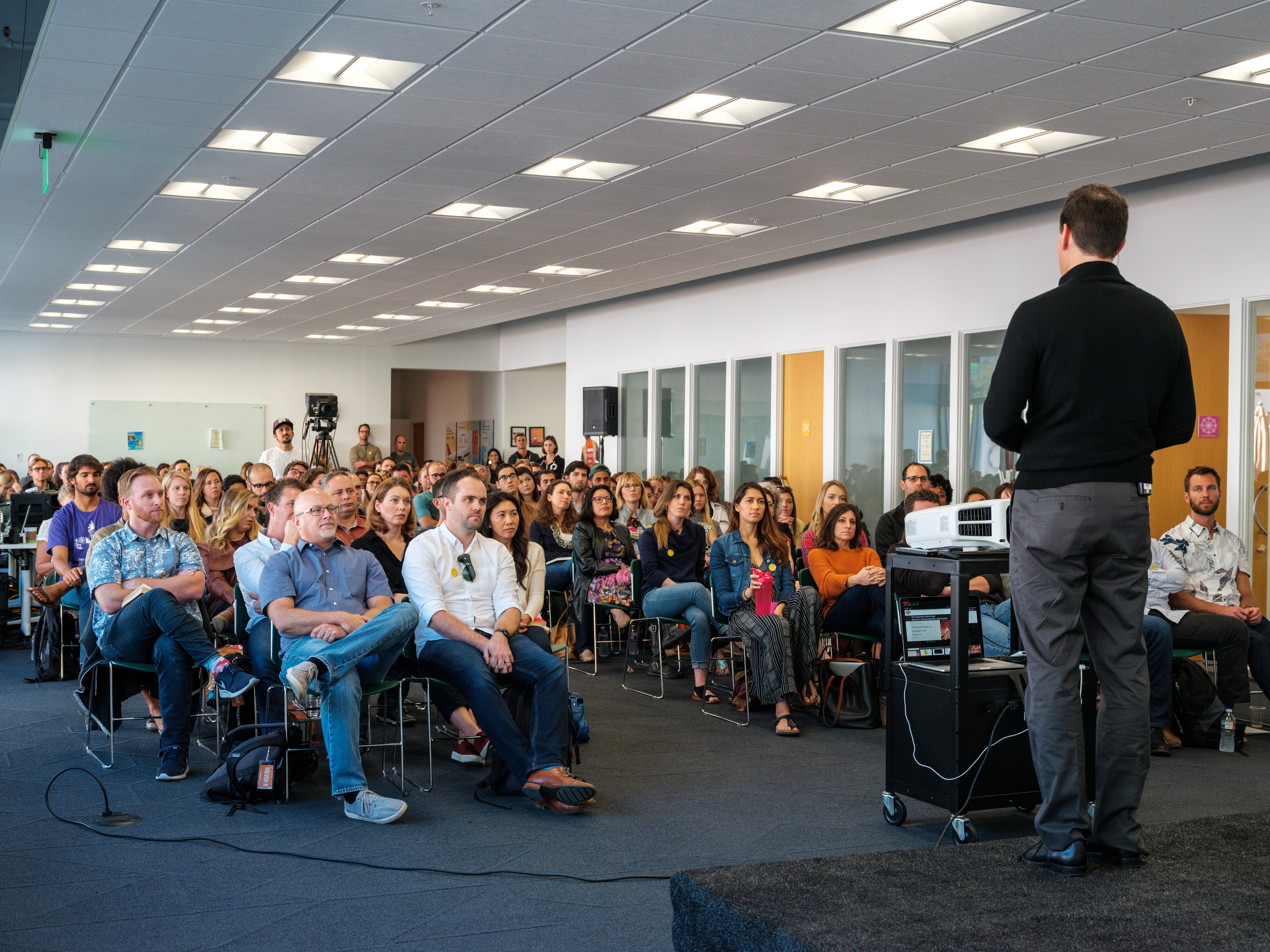As one of just five global finalists for 2019’s coveted ICF Prism Award, Procore Technologies is in terrific company. The International Coach Federation’s previous honorees include Coca-Cola and Google, for instance. And while the California construction software outfit has been plenty feted for its technological moxie, this globally recognized nomination has nothing to do with the innovative mysteries of computer science, and everything to do with the much less comprehensible subject of human potential. “Coaching is sitting in partnership with your client (physically or virtually), someone who is often seeking some kind of shift. It’s about creating an understanding of ‘where do you want to go?’ and letting them know that I am their partner in the journey to get there.”
The term “Executive Coaching” conjures an image. Maybe we picture a Tony Robbins-type Life Coach—8 feet tall and striding back and forth on a raised stage yelling “I am not your guru!”
Nope.

Jeanne Smith is focused on Curiosity and Strengths.
Jeanne Smith, Procore’s Coaching Culture Architect, sums it up. “Everything we do is to move somebody forward—to reveal the best of that individual so that they can do their best work.” Once a year, the ICF Prism Award is bestowed upon a global business entity whose coaching ecosystem meets several rigorous criteria. Procore Technologies is one of five global nominees for the honor this year. 2019’s Prism Award recipient will be announced during the International Coach Federation’s yearly gathering, Converge, which meets October 23–26 in Prague, Czech Republic.
To Be
Executive Coaching is largely mysterious to the uninitiated, but the culturally endearing ideal of the “coach” as an inspirational figure isn’t new. Workplace coaching as we know it today can be largely traced to The Hudson Institute of Coaching, begun by the Fielding Graduate Institute’s founding president Frederic Hudson in the late 80s. Hudson’s idea was simply to formalize and build on the interpersonal high octane inherent in the coaching relationship, liberating the potential of those in positions of critical corporate leadership.

Procore Senior Executive Coach, John McClure.
For the past twenty-five years or so, Executive Coaching has become an increasingly familiar element of the successful business enterprise. As it happens, Procore’s ICF-recognized coaching program hit the ground running a scant 18 months ago. How does an initiative of this scope go from zero to sixty in such short order? Procore Senior Executive Coach John McClure nutshells the saga, which began when Procore Founder and CEO Tooey Courtemanche took a business trip to Canada.
“The leaders of that Canadian company were focused on people’s individual growth through coaching and a coaching culture,” John says avidly.
This interpersonal approach to success impacted Procore’s CEO Tooey Courtemanche during his visit. It was clearly fundamental to his host’s corporate culture. “Tooey came back to California and planted the seed for a coaching culture at Procore.” Okay, there was the plan. How did today’s Executive Coaching team come together? The usual magic.
“Corporate Serendipity” is Not an Oxymoron
McClure is on a tear. The story is as colorful and unexpected as the unlikely idea of warm corporate heartwork. Tooey’s enthused desire to inculcate Procore’s already heart-forward workplace environment with a coaching ecosystem—it got things rolling. “Tooey tapped Michelle (Greer, Procore’s SVP of People), and Michelle tapped Greg and Jeanne Smith, and I happened to come across Greg serendipitously at that point in time.” Greg “Coach” Gills is the George Washington-like founder of the once-nascent coaching program at Procore—minus the powdered wig and stern expression. Gills opened the space and carefully set the table in prep for the full coaching feast that would shortly be served to Procore. “It all came together in December of 2017,” John continues. ”We came aboard as contractors to do some scoping. In January we were invited to join Procore full time, at which point we started mapping out what it is we wanted to build.” Okay. And the serendipity?

Greg “Coach” Gills (left) making a point.
“I was a sales leader at Intel for 30 years, living here in Santa Barbara for about 10 years of that time. For those 10 years, I commuted on (California-based commuter airline) Surf Air. And on those flights, I’d met all the Procore executives. You know, just as fellow passengers. I’d chatted up Steve (Zahm, Procore President) and Rusty (Reed, Procore Chief Strategy Officer) in particular. I had no intention of ever pursuing coaching or anything of that sort.” There’s the Serendipity, and here comes the road to Damascus.
“In 2015 I was sent as part of my leadership training at Intel to learn about coaching skills. I went to the Hudson Institute for a year-long coaching skills training journey, within which I decided I wanted to be a coach. Right there I decided to leave Intel and become a coach. Toward the end of that roadmap in August 2017 I had reached out to Steve and Rusty and said, “Hey, you know, we’ve been talking about this coaching thing…I’m actually ready to make a move. What’s happening over at Procore?’ And that’s when it kind of came together.” John pauses for a couple of beats.
Coaching is all about unlocking growth. It doesn’t analyze why you are the way you are.
“Coaching is all about unlocking growth. It doesn’t analyze why you are the way you are. If you want to know more about that, go see a psychologist. Coaching is a partnership, and that’s very important to understand. It’s not mentorship, and it’s not wisdom passed from teacher to student. It’s a partnership. You know what’s important to you—you know it better than anybody else. What I know is a process that may just help you find the answers that live inside you already.”
Curiosity + Strengths
Jeanne Smith’s office is a cozily lit living room ensconced in the middle of a fluorescent warren of Procore offices and meeting rooms. The lamplit vibe is transporting. Jeanne is Procore’s Coaching Culture Architect (“…try saying that three times fast,” she says with an arched eyebrow) and her role is to assure the buildout of a successful coaching culture at Procore.

Procore CEO Tooey Courtemanche saw the value in positively focusing on the individual.
“So,” she says with a grin. ”I guess that begs the question—what does success look like?” Jeanne leans forward. “If I can raise the awareness of every Procorean—show them how to listen effectively, how to identify and leverage individual strengths, how to lean into asking versus telling—we’re going to have an organization that leads with curiosity, empathy, optimism, and energized success.” To the pregnant pause that follows, she adds “…the two key stakes in the ground for Procore’s coaching program are Curiosity and Strengths. And the Strengths piece is really my background prior to coming to Procore, working with Marcus Buckingham, who is the global thought leader on Strengths.”
“Curiosity” and “Strengths” are potent bywords in the new organizational zeitgeist—concepts in part allied with thought leader and founder of the Strengths Revolution, Marcus Buckingham. Nine Lies About Work—Buckingham’s best-selling treatise on how to parlay individuality and uniqueness into a deeply-rooted, personally nourishing success strategy—delves into freethinking leaders and helpful attention, rewiring conventional corporate wisdom about what motivates us. “Working with Marcus for the last five years and spreading the word of Strengths to his fine clients gave me an opportunity to experience the impact first hand,” Jeanne says. We’re wired for negativity; we have a negativity bias. And so typically the first thing we want to know is what’s wrong? Where’s the gap? How can I fix that?”
Coach Approach
She’s right, of course. Standard procedure is to come into a situation with an eye to ‘where is this thing broken?’ Jeanne clarifies.
“It’s a conscious ongoing effort to turn that negativity on its head, an effort to say I want to understand what you are doing right. What energizes you? Where is your day flying by and what are you aware of that you’re doing during these times? Let’s do more of that. Let’s use that as the lens.” Placing authentic curiosity back where it belongs—in the chewy center of an individual’s daily life—is a catalyst. “Welcoming curiosity elicits the emotional cue that says, ‘I really want to hear what you think.’ And in that, you build a trusted environment for people to fail!” Jeanne gets animated discussing this liberation of historically stilted work processes.
“Innovation doesn’t come from an existing condition, but from an environment that is open to being challenged—thinking outside the box and feeling safe to contribute.”
Jeanne and her team are bringing what they call a “coach approach” to everyone at Procore, especially anyone who leads a team. What this means is giving leaders the knowledge and skills training to be more coach-like in their interactions, with listening and curiosity. Recently some of these leaders became certified as internal coaches themselves through an ICF-accredited program with the Hudson Institute. “We want our leaders to embody coaching skills—to be exposed to the journey of what it means to be a coach. Our leaders are bringing these coaching skills to their teams, first and foremost.”

Procore employees at a learning and development session.
Google’s Project Oxygen, launched in 2008 to determine—as exactingly as possible—what makes a great manager, came up with a participatory tipping-point figure: a prescribed level of buy-in that their research shows would set a company on a course of continual improvement. Procore’s “Coach Approach” should, by its nature, meet these coaching adoption goals. “Project Oxygen suggests that 60% of people leaders and 35% of individual contributors partake of coaching—and if you’ve got everyone at the C-suite, that comprises successful engagement through coaching.”
Yes, I’m listening—and drowsily staring around the throw pillow-festooned conversation pit Jeanne calls an office. The incandescent lighting is dialed down to a soothing mimicry of dusk, and it seems at best implausible that somewhere in this byzantine compound, computer code is being written. What do we do here again? Something with construction? Wryly noting my response to the environs, Jeanne explains how to feed and water human growth.
“There is something that happens when an individual gives their full attention and interest to another, when someone really takes the time to do that. It’s transformative. I don’t even have to say anything. I watch a client walk in my door and sit down for one-on-one attention—that’s already powerful. And then I get curious, and I start asking questions.”
Curiosity, Actually
Jeanne Smith, John McClure, Greg “Coach” Gills, Courtney Birch Webster, and Lisa O’Brien are on the ground floor of an initiative they know will transform Procore as a place of work as a place of personal evolution, and as a place that foments the individual Procorean’s desired growth. Their herculean efforts over the past 18 months have already drawn the attention of the International Coach Federation, whose Prism Award announcement would surely put a fine point on all the Procore team has achieved in their bracingly steep climb to international coaching recognition. The sparks, though, come from another place.

“We’re going to have an organization that leads with curiosity…”
“I really think it’s about just being with people’s humanity,” Jeanne says suddenly. “It doesn’t matter who, what, where, when, why—it’s simply being present with another human being that creates the space for self-discovery and transformation.” Procore’s Coaching Culture Architect settles back in her chair. The big questions—the ones that really matter? Jeanne—and her like-spirited tribe all over the world—have been asking them all along.
“I grew up in Philadelphia. At six years old I used to ask my mom to take me to the airport. This is when you could go right to the gates. I’d love to go to an arrival gate, and I would try to figure out—when somebody is waiting there, who are they waiting for? What’s the reunion going to look like? And then at the departure gate…” Jeanne pauses. “What’s going to happen to that person when their loved one actually gets on the plane?”
Leave a Reply